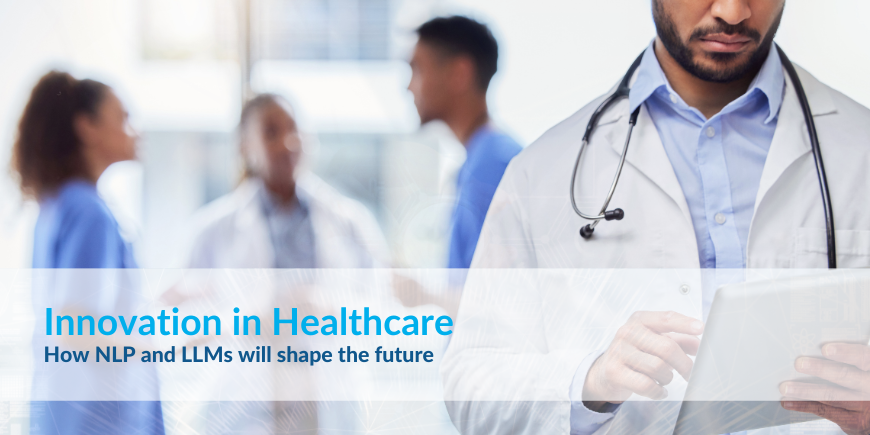
Innovation in Healthcare:
How NLP and LLMs will shape the future
Continuing digitization offers great potential in healthcare. From electronic medical records to telemedicine solutions, digital technologies are fundamentally changing the way we experience healthcare. A key component of this transformation is Natural Language Processing (NLP) in combination with Large Language Models (LLMs). In this blog article, we describe how these technologies are driving digitization in healthcare and the opportunities, as well as challenges, they present.
The importance of NLP and LLMs in healthcare
1. Automated Documentation
One of the most significant applications of NLP and LLMs in healthcare is automated documentation. Medical staff often spend hours writing patient internal records and reports. With the help of NLP, we are already automating these tasks. For example, these technologies are able to convert spoken information into text while identifying relevant medical terms and codes. This not only saves time, but also reduces the risk of errors in documentation.
Find out how Averbis is revolutionizing healthcare documentation with speech technology (here).
2. Diagnostic Support
LLMs such as GPT-4 have impressive text processing and comprehension capabilities, which could be used in the future to help physicians diagnose diseases and develop treatment plans. With access to extensive databases of medical literature and medical records, it is possible for LLMs to provide relevant information and even suggest alternative diagnoses. This would help improve the accuracy of diagnoses and optimize patient care.
3. Personalized medicine
Another area where NLP and LLMs could become important in the future is personalized medicine. By analyzing patient data, including medical history and combining it with data from wearables, these technologies can create tailored treatment plans. This enables physicians to tailor therapies and medications to each patient’s individual needs, increasing the effectiveness of treatment and minimizing side effects.
Challenges and Concerns
Although NLP and LLMs offer enormous opportunities in healthcare, they are not without challenges and concerns. Here are some of the key points:
1. Data Protection and Security
The processing of healthcare data is extremely sensitive and requires strict data protection measures. The misuse or theft of patient data can have serious consequences. It is critical that providers implement robust security measures to ensure data integrity.
2. Ethics and Liability
The use of AI technologies in healthcare raises ethical issues, particularly with respect to liability for medical decisions made by machines. It is important to develop clear guidelines and regulations to address these issues and ensure that the use of NLP and LLMs is done in accordance with ethical standards.
3. Culture
The use of artificial intelligence is already causing controversy in society. This is not just about the fear of losing one’s job. The texts generated by LLMs are hardly distinguishable from those of a human. This requires not only a high degree of trust in the results of LLMs, but also the acceptance that the interaction between physician and patient is at least partially supported by technology. To build trust among medical staff and patients, the rationale for using AI as a decision-support tool must be understandable. This is a major challenge, especially in the case of LLMs, since even the developers of such models can no longer explain how the results are obtained due to their complexity.
4. Human Interaction
Although automation of healthcare processes can be efficient, human interaction remains irreplaceable. Physicians and nurses play a critical role in patient care. Technology can mitigate the shortage of skilled workers and serve to support medical staff.
Conclusion
Averbis believes that LLMs offer a great opportunity for the healthcare industry. Especially in the reduction of administrative processes and the creation of interoperability in health data. This will give medical staff more time for patients and their treatments.
Currently, Averbis is evaluating solution concepts for data protection-compliant training of LLMs with anonymized (and synthetic) health data and for the operation of LLMs in on-premise environments, taking into account data protection regulations.
The future of digitalization in healthcare will undoubtedly be shaped by NLP and LLMs, and it is up to us to ensure that these innovative technologies are used responsibly.

